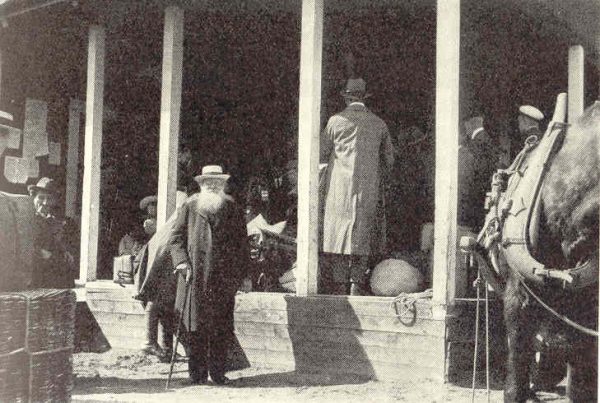On workdays I eat burritos at a café in Downtown Los Angeles. The staff knows my lunch routine: combo with a diet coke, add one sugar cookie. They also know my jale . . . I’m the customer who works for “the city” and “inspects buildings in South Central L.A.”. I like their succinct characterization of the job.
Most of the café workers live within city limits, outside of the unincorporated County jurisdiction I serve. But that doesn’t matter. I’ve talked with a few workers about legalizing informal garage conversions. Others inquire about yard sale permits and home-based business laws. I never ask why they want to know. I already know why: they need help. I always oblige. The basics of zoning are the same on either side of a municipal border. And I’ve learned enough about neighboring jurisdictions’ ordinances to help them out.
I give my planning and zoning advice gratis. Long before I became an urban planner, I knew your average city hall was intimidating as f*ck. There are too many irritable, finger-wagging bureaucrats straight up confronting the public. Not all staffers, of course; and yet every government office has them.
There are too many befuddling rules about property use. Too many expensive permits to navigate. Too many plan-tastic! acronyms to decrypt (CEQA, CUP, CoC, and so on). And too often, constituents are treated as nothing more than a number on a sign-in sheet. It’s enough to keep already-weary people away.
By contrast, we’re on a first name basis at this café. We have no defensive postures, no presumed incivilities coming from either side. Chinwag? More like chisme. Without hesitations or hostilities. We know each other. We’re on the level.
Recently, I learned about a café worker getting ensnared in the city’s code enforcement process over an unpermitted back house. It was built without permits, a common practice with many explanations. She was panicking. The first contractor hired took her money and ghosted. That particular brand of thievery happens far too often in L.A.’s underprivileged communities of color. It’s especially common in immigrant neighborhoods with higher rates of undocumented residents, where people want to lay low. A second contractor seemed lost in the bureaucracy.
The story angered me. I did two things to help. First, I took time to explain the State’s new Accessory Dwelling Unit laws. Cities and counties weren’t doing enough to alleviate the statewide housing crisis. In an extraordinary move defying home rule, State legislators usurped local control to remove many zoning obstacles to building backyard dwellings. I’m getting the word out.
[alert type=alert-white ]Please consider making a tax-deductible donation now so we can keep publishing strong creative voices.[/alert]
Second, I connected her with a reputable permit expeditor I met doing my work in South Central. After years of debating land-use violations with contractors and consultants, you develop a sense of who’s a predator and who’s legit. Conflict of interest rules don’t allow me to refer my County constituents to private enterprises for services. It’s a reasonable constraint to prevent payola. The unfortunate flipside is that I can’t tell them when I suspect a predatory businessperson, either. I can’t “officially” say it lest I disrupt private business transactions, so the logic goes (though, there’s always potential for unofficial dialog between two adults). But outside of my strict jurisdictional confines I can connect any resident to any trustworthy consultants out there – and that’s exactly what I did.
When we chat at the café about urban planning matters, I speak in plain language. Oftentimes it’s in Spanglish, whatever makes them comfortable. Showcasing some kind of planner’s argot is worthless – damaging, in fact – when building relationships on the ground. The point is to connect in authentic conversation.
We’ve transformed this café into somewhat of an informal, extra-jurisdictional urban planning field office! You’ll find me there weekly. I love every worker at this joint. I treat everyone working there with hella respect. That job is tough. They work long hours in tight spaces standing over hot stoves. I couldn’t do it. I’m so grateful they’re doing it with pride.
At least once a week I plunk down $6 for a delicious burrito. They always accommodate, either asada or pollo, with generous dollops of sour cream, guacamole, and salsa picante. But sometimes someone will add a little extra something. Like the time recently when one of the workers expressed thanks for some zoning enforcement advice by knocking off 35% from my burrito bill.
Walking to the cash register, I noticed the handwritten discount scrawled onto my receipt. I let slip a knowing little smile. This was a very meaningful gesture: a modest yet deliberate expression of mutual aid at lunchtime. Mutual aid is the act of providing reciprocal help for shared benefit. Rarely do we find a concept so perfectly and paradoxically fitted to the work of anarchists and police officers.

In Mutual Aid: A Factor in Evolution (1902), zoologist and anarchist philosopher Peter Kropotin examined the benefits of collective cooperation among animals and humans. Kropotin’s observation on sociability among bees is instructive for humankind, then and now: “the practice of solidarity proves much more advantageous to the species than the development of individuals endowed with predatory inclinations.”
The café bosses, I presume, wouldn’t approve of the kick down. But it was done anyway. That’s how we do it. We take care of each other. I put it back in the propina.
This approach is my approach. This is one of many ways I demystify urban planning. Every café chat dismantles barriers. It’s an unorthodox but effective outreach tactic. I don’t expect other urban planners to do it just like this. But I do expect all urban planners to care enough to think about new ways to help the people we serve.
